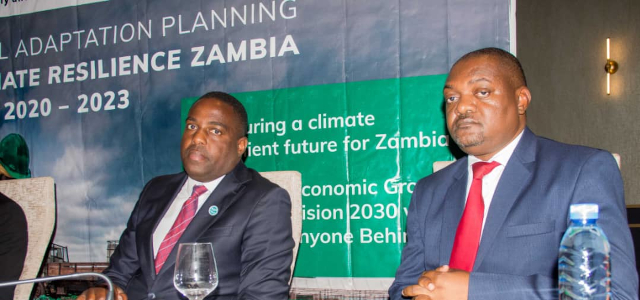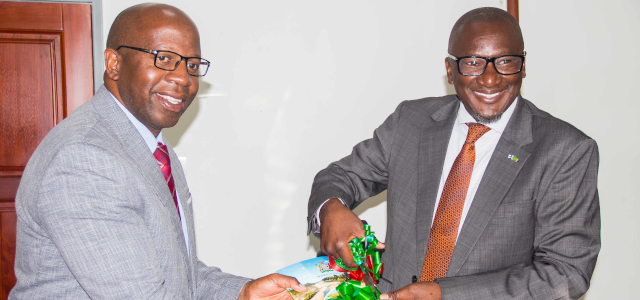In his official keynote address, the Minister of Green Economy and Environment, Hon. Eng. Collins Nzovu said he was proud that Zambia had become the 17th African country to have a NAP as a commitment to addressing climate change under the United Nations Framework Convention on Climate Change (UNFCCC). He said the NAP identifies adaptation actions to reduce the impacts of climate change in the Agriculture, Forestry, Energy, Water, Infrastructure, Tourism, Wildlife, Mining, and health sectors.

Zambia’s Minister of Green Economy and Environment (MGEE) Hon. Eng. Collins Nzovu delivering his speech during the launch
“Climatic events affect everything from the agricultural field, roads, water supply, and education hence the development of the NAP for climate-resilience. Our government has taken steps to manage & mitigate climate disasters in affected communities. People want the tools to prepare so that when climate events occur their lives can continue without or with minimal disruptions. We now need to mobilize resources for the successful implementation of the NAP. Communities across Zambia will only feel the real impact if all stakeholders are fully involved & are proactive in the effective implementation of the NAP,” said Hon. Eng. Nzovu.
Mr. Alex Simalabwi, Executive Secretary, Global Water Partnership Southern Africa -GWPSA said he was excited about the partnership with the Government of Zambia which had seen the Zambian NAP being recognized by the Green Climate Fund as the best-performing NAP process in Africa.
“We are devising financing strategies that will support the implementation of the prioritised adaptation actions in the NAP. The strategies will help unlock resources for the Zambia Water Investment Plan (ZIP). The connection between the two is that successful resource mobilization to implement the water sector adaptation actions in the NAP will leverage us $5.75 billion required for the ZIP, specifically by contributing to the climate-resilient water investments in the ZIP,” he explained.

GWPSA Executive Secretary Mr. Alex Simalabwi (left) with the NAP Zambia Project Manager Mr. Joseph Mbinji during the Launch
The NAP identifies opportunities for integrating prioritised adaptation actions into national, sectoral and sub-national planning budgeting processes. The NAP also clearly outlines indicators and responsible institutions that will enable, track and report progress in the implementation of proposed adaptation actions. It is expected that the NAP will also enable Zambia to systematically advance the implementation of the aspirations of the 8th National Development Plan and Zambia's Nationally Determined Contributions.
Early 2020, the GCF approved Zambia’s proposal and granted the government a readiness grant to the tune of us$2.1million for the preparation of the NAP in a phased approach.
The first phase focused on developing an over-arching NAP covering nine key sectors highly impacted by climate change include agriculture, fisheries and livestock, water, energy, tourism, wildlife, health infrastructure, mining.
The second phase will cost about US$900,000 is expected to commence early next year and will focus on developing the water sector NAP.
Meanwhile, on 8th November 2023, the National Adaptation Planning (NAP) Project convened a stakeholder consultative meeting to review the first draft of the inception report to develop a Resource Mobilization Strategy for climate-resilient low-carbon development in Zambia and to define the roadmap for the implementation of the National Adaptation Plan (NAP), the Zambia Water Investment Programme (ZIP).
"The purpose of convening this meeting is to support the Government’s efforts in not only implementing the NAP and ZIP but to devise financial strategies that will enable mobilization of the requisite resources for their smooth implementation. The Government’s approach is not only to end at devising national plans but now there is an emphasis to go further and develop accompanying investment plans or resource mobilization strategies," said Mr. Herrick Mwewa, Principal Climate Change Officer as he opened the meeting.
